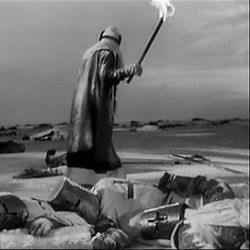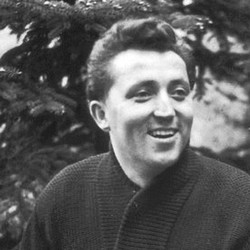- Details

The texts from Des Knaben Wunderhorn can explain both a story or the horrors of war; speak ironically about a miracle or expressing a deep spirituality. This is the case with Urlicht. We don't know who wrote it, nor if it was eventually modified until the form we know thanks to Brentano and Arnim, but we can assume that this anonymous (and maybe collective) author was familiar with the gospels and Catholic rites.
- Details

On 23 November 1938, Alexander Nevsky, a film directed by Sergei Eisenstein, was successfully premiered in Moscow. The film recreated an episode that took place in Novgorod in the 13th century: an army composed mostly of peasants achieve the victory over the foreign invader, an army mostly of knights. As if this were not enough, the final battle was fought over the ice of Lake Peipus and, as you can imagine, Eisenstein didn't miss the opportunity of filming an epic scene.
- Details

When Adelaide was first published, in 1797, there was a subtitle: "a cantata for solo voice with accompaniment for piano”. We probably wouldn't call it nowadays a cantata, and it's not exactly a Lied either; it approaches the “operatic songs” that were fashionable in Vienna at the end of the 18th century. But Adelaide is usually performed in song recitals, that meaning that it can also be presented here on Liederabend, and it's always a pleasure to listen to that piece, no matter how it's classified.
- Details

This blog began in February 2012 with a Lied by Schubert (of course), and after Strauss, Schumann, Duparc, Mahler and Vaughan Williams, we heard Fauré in April. I've never planned the contents in chronological order or any kind of order, I leave that for my courses; They are songs who usually asked me to be shared, and those first posts mostly respond to the request of songs so often heard. We've heard six more works by Gabriel Fauré so far, and while preparing this article in which we're listening to the eight one, I realized that I haven't talked yet about his importance as a composer of mélodie. Maybe it's time to write some lines about because Fauré is a central [...]
- Details

This article will be posted the first week of September, but I am writing during the Schubertíada, with my mind full of music, thougts and emotions. After so many months without live music (except for two concerts at the Palau de la Música, happily enough), the immersion has caused me a strong emotional impact, a smile from ear to ear under the face mask, tears wiped by the same mask and a immense satisfaction from realizing that the joy, even the euphoria, is shared. I would say that Vilabertran is being the scene of a collective catharsis.












